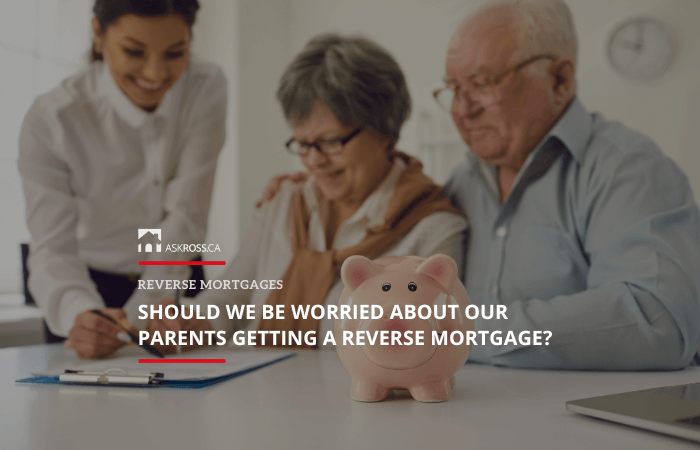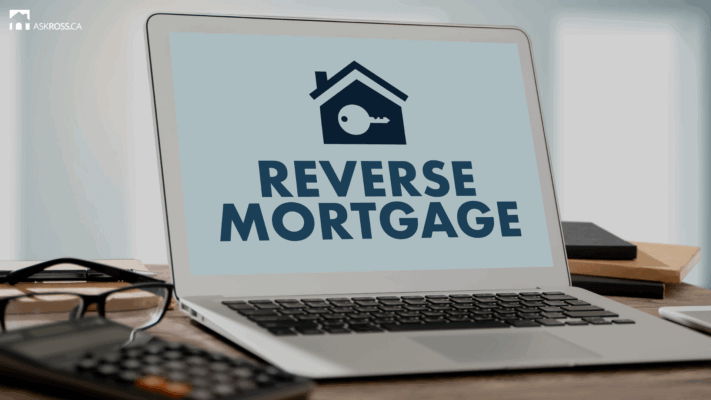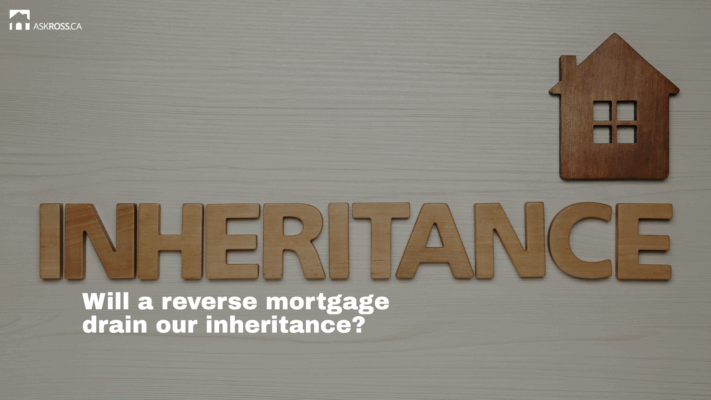
Published: June 3rd, 2025 • Last Updated: November 19th, 2025
Author: Ross Taylor on AskRoss.ca
Are Reverse Mortgages Safe for Your Parents? Myths, Facts, and Family Advice
When I sit down with families, usually adult children alongside their parents, the mention of a reverse mortgage often brings out the skeptics. And I get it. It’s a big decision, and there’s a lot of misinformation floating around.
But here’s the truth: reverse mortgages have changed, and in today’s Canadian mortgage landscape, they can be an incredibly smart, safe, and empowering financial solution for older homeowners.
This article is written for those adult children who are concerned, cautious, or even outright opposed to their parents tapping into their home equity.
I want to unpack the facts, address the real risks, and show you why a reverse mortgage might actually benefit the whole family, not just your parents.
Jump to a specific section in this article ↓↓
- What exactly is a reverse mortgage in Canada?
- Will a reverse mortgage drain our inheritance?
- Will the bank take their house?
- What happens to the home after my parents pass away?
- Are there financial exploitation risks with reverse mortgages?
- Will this limit my parents’ care options in the future?
- What about helping the next generation now?
- Comparing Canada’s top reverse mortgage options
- Are reverse mortgages expensive?
- Advice from Ross Taylor Mortgages

What exactly is a reverse mortgage in Canada?
Reverse mortgages are designed for Canadians aged 55 and older who want to access the equity in their home without selling it and without making monthly mortgage payments.
Your parents can stay in their home for as long as they want, maintain full ownership, and receive tax-free cash in the form of a lump sum, scheduled payments, or a combination.
Companies like CHIP by HomeEquity Bank, Equitable Bank, and Bloom Financial offer modern, regulated products with some impressive consumer protections built in.
Key features of a reverse mortgage:
- No monthly mortgage payments required.
- Tax-free money that won’t impact OAS or GIS.
- Full homeownership remains with the borrower.
- Funds can be used for any purpose.
- A No-Negative-Equity Guarantee so your family will never owe more than the home’s value.
- Mandatory Independent Legal Advice to ensure no one’s being pressured or misled.
Let’s break down the biggest worries I hear from adult children and how they’re addressed.
↑↑ Back to the list at the top ↑↑

Will a reverse mortgage drain our inheritance?
Short answer: Not necessarily, and sometimes the opposite.
This is by far the most common concern. Nobody wants to see their parents’ hard-earned equity vanish, especially if you’re expecting to inherit the home one day. But here’s what often gets missed:
The reality behind equity and appreciation
While a reverse mortgage loan balance grows over time, so does the home’s value in most Canadian markets. For example, if your parents’ $700,000 home has a $300,000 reverse mortgage, a 3-4% annual home appreciation often matches or exceeds the loan growth, preserving equity.
Plus, with Canada’s No-Negative-Equity Guarantee, if home values drop, the lender, not your family, covers any shortfall. Reverse mortgages are non-recourse loans, so the estate never owes more than the home’s worth.
↑↑ Back to the list at the top ↑↑

Will the bank take their house?
Absolutely not. That’s a myth.
In a reverse mortgage, your parents remain the owners of their home, full stop. There’s no title transfer, no bank taking over, no forced sale.
Here’s what lenders do require:
- The home must remain their primary residence.
- They must keep up with property taxes, insurance, and maintenance.
- That’s it.
As long as these simple conditions are met, they can live there for their entire lives, even if they live to be 105. The home only needs to be sold once they’ve moved into a care facility or passed away.
↑↑ Back to the list at the top ↑↑

What happens to the home after my parents pass away?
If your parents pass away while holding a reverse mortgage on their Canadian home, the process is relatively straightforward, and importantly, you’re not on the hook for their debt.
When does the loan become due?
The reverse mortgage becomes payable immediately after the last surviving borrower passes away. The responsibility to repay the loan falls to the estate, not to you or any other heirs personally.

What are my options as an heir?
You generally have two clear paths forward:
1. Sell the home
This is the most common option. The estate sells the home, and the proceeds go toward paying off the full balance of the reverse mortgage, including any accrued interest and fees. Any remaining equity goes to the heirs.
2. Keep the home
If you or your family members want to keep the property, you can repay the reverse mortgage using personal funds or by taking out a new mortgage in your own name.
Most lenders allow a window, typically between 30 and 180 days, for the estate or heirs to settle the loan.

What if the home’s value is less than the amount owed?
Reverse mortgages in Canada are non-recourse loans. That means if the home sells for less than what’s owed, neither the estate nor the heirs are liable for the shortfall. The lender absorbs the loss. You’ll never owe more than the home’s final sale price.

Other considerations
- You don’t have to sell the home – As long as the reverse mortgage gets repaid (via sale or other means), the decision is yours.
- No inheritance tax – Canada doesn’t have an inheritance tax, but if you keep the home and later sell it, capital gains tax may apply if it wasn’t your principal residence.
- Probate process applies – The home will go through probate as part of the estate, and provincial probate fees may be triggered.
So while there are steps to follow, the process is fairly straightforward and manageable. And no, you won’t be left dealing with a lender chasing you down for your parents’ debt.
↑↑ Back to the list at the top ↑↑

Are there financial exploitation risks with reverse mortgages?
One of the biggest fears we hear from adult children is the worry that their parents are being taken advantage of, that reverse mortgages are predatory or exploitative.
That concern isn’t unfounded; horror stories from the U.S. have made their rounds.
But here in Canada, reverse mortgages are governed by strict federal regulations, and lenders like CHIP (HomeEquity Bank), Equitable Bank, and Bloom Financial are all federally regulated Schedule I banks, under the direct oversight of OSFI.
More importantly, Independent Legal Advice (ILA) is mandatory before any reverse mortgage can be finalized.
- A third-party lawyer sits down with your parent(s), confirms they fully understand the terms, and ensures they’re not being pressured or manipulated in any way.
- In fact, HomeEquity Bank reports that about 23% of applicants walk away after their legal review; clear evidence that the safeguards work.
- Fees, interest rates, and repayment terms are disclosed upfront, with no hidden clauses.
So no, this isn’t the Wild West. It’s a well-structured, consumer-protected financial product—if you know where to look and who to trust.
↑↑ Back to the list at the top ↑↑

Will this limit my parents’ care options in the future?
Surprisingly, reverse mortgages often expand your parents’ care options.
Let’s face it, aging in place is the goal for most seniors. And with in-home care costs rising, many older Canadians simply don’t have the cash flow to make it happen. That’s where a reverse mortgage can shine.
How reverse mortgages support better aging:
- Funds can be used to cover the cost of in-home care services.
- Your parents maintain their dignity and independence.
- They won’t need to rely on you or your siblings financially.
- You avoid needing to tap into your own retirement savings to help them later.
It can even be a bridge solution, giving them a few more years at home before long-term care decisions need to be made.
↑↑ Back to the list at the top ↑↑

What about helping the next generation now?
Here’s a thought: Instead of waiting to inherit the home, wouldn’t it be more helpful to receive support when you need it most?
The “living inheritance” strategy
With home prices skyrocketing across Canada, many parents are using a portion of their reverse mortgage funds to help their kids with:
- Down payments on their first home
- Paying off high-interest debt
- Starting a small business
- Supporting grandkids’ education
I’ve worked with clients who used a reverse mortgage to gift their children $100,000 each for down payments. That’s two homes now growing in value instead of one, and everyone benefits.
Comparing Canada’s top reverse mortgage options
Here’s a quick snapshot of the key players:
| Feature | CHIP (HomeEquity Bank) | Equitable Bank | Bloom Financial |
|---|---|---|---|
| Max Loan-to-Value (LTV) | 55% | 59% | 55% |
| Available In | National | ON, BC, AB, QC | ON, BC, AB |
| Unique Offering | CHIP Open (no penalty) | Rate Match Guarantee | Prepaid Mastercard® |
| Setup Fee | $1,795–$2,795 (+$350 appraisal) | $995 | $1,200 (+appraisal/legal) |
| Interest Payments Optional | Yes | Yes | Yes |
Each lender has its strengths. CHIP is the original and most widely available. Equitable Bank often offers a higher loan amount. Bloom is user-friendly, and some say they are geared toward tech-savvy seniors.
↑↑ Back to the list at the top ↑↑

Are reverse mortgages expensive?
Reverse mortgages do carry higher interest rates than traditional mortgages or HELOCs. But there’s a reason:
- There are no income or credit qualifications.
- There are no monthly payments required.
- And you get the No-Negative-Equity Guarantee.
That peace of mind comes at a premium. But here’s the kicker: your parents can choose to pay the interest if they want to preserve equity, or they can let it accrue. The flexibility is unmatched.
Typical upfront costs (legal fees, appraisal, setup fee) range from $2,000–$3,000 and are deducted from the proceeds, meaning very little (if anything) is paid out-of-pocket.
↑↑ Back to the list at the top ↑↑

Advice from Ross Taylor Mortgages
Here’s what we tell our clients, parents and adult children alike:
Start with a conversation, not a conclusion. Don’t dismiss reverse mortgages outright because of something you heard ten years ago. The products have matured, the protections are strong, and the options can be life-changing.
If your parents are house-rich but cash-flow poor, or they want to help you and your family now while enjoying their retirement comfortably, then a reverse mortgage might just be the smartest move they can make.
Arrange a family meeting. Speak with a mortgage advisor. Crunch the numbers. Make the decision together, with eyes wide open.
We’ve seen reverse mortgages save retirements, preserve dignity, and build family wealth across generations. Done properly, they’re not a last resort. They’re a powerful planning tool.
And if you’re still unsure? Let’s talk – we’re here to help.
↑↑ Back to the list at the top ↑↑

Ross Taylor Mortgages
If you want great service from someone you can trust – reach out to us today.
Get quick answers to your questions, no matter how difficult – 7 days a week.

 Apply For a Mortgage
Apply For a Mortgage